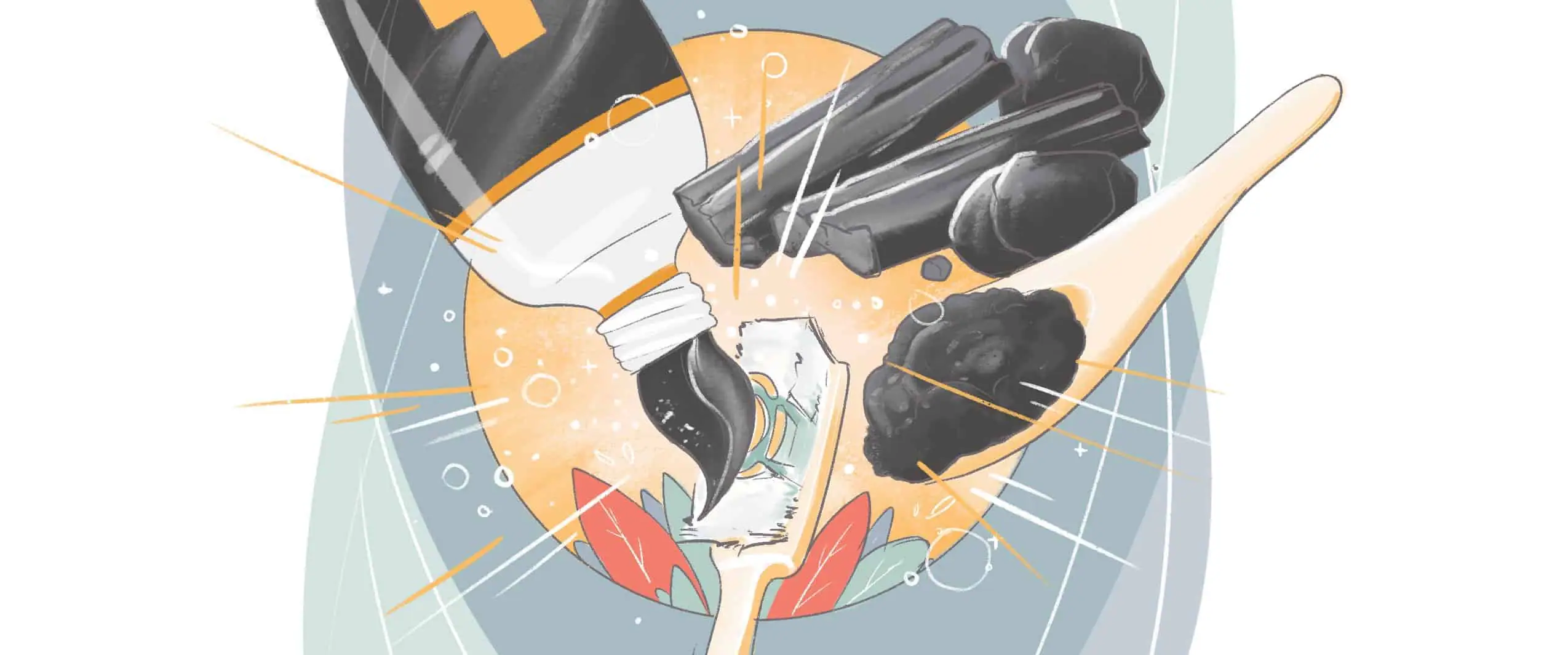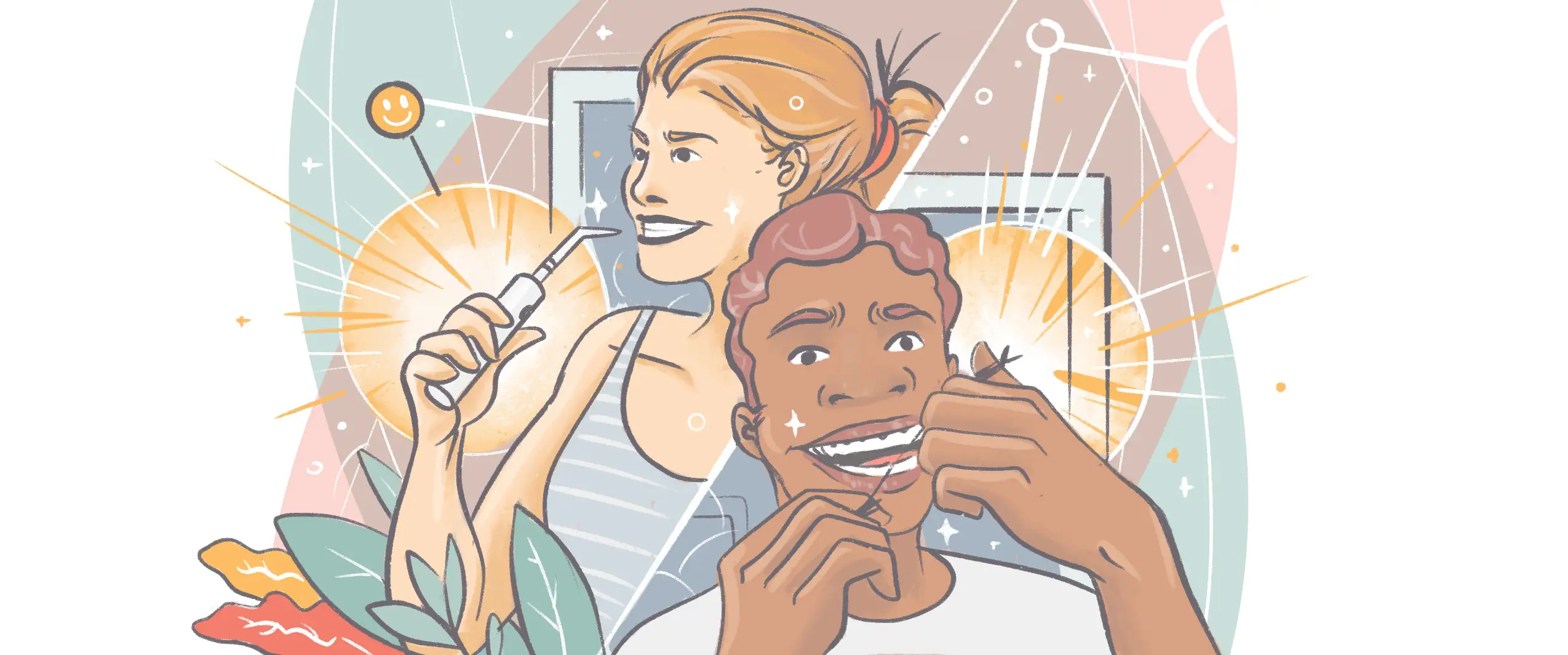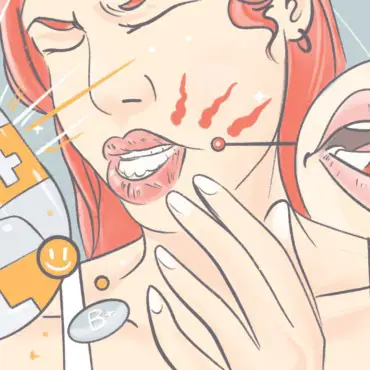Why have charcoal toothbrushes become so popular in recent years? Do charcoal toothbrushes work? The bristles of a charcoal toothbrush are infused with activated charcoal. They’re usually made by oxidizing coal, coconut shells, olive pits, and other similar materials.
This creates a fine grain powder that is then heated to a high temperature to activate it. This increases the surface area and makes it more porous.
What does a charcoal toothbrush do?
So, what’s all the fuss about a charcoal toothbrush? Why should you consider switching from a regular toothbrush to one that has been infused with charcoal? There are indeed some benefits that come with using this rather unconventional type of toothbrush.
Whiter Teeth
Activated charcoal has gotten a lot of attention in recent years because of its ability to whiten teeth. You may have already seen toothpaste or specially made tooth whitening powders extolling the fact that they contain activated charcoal.
The powder is highly absorbent, allowing it to bind with acidic components of beverages like coffee, tea, and wine that tend to lead to discolored teeth over time. When it binds with these components, it pulls them off your teeth, helping to remove stains and keep your beautiful chompers whiter.
However, activated charcoal can actually be quite abrasive on your teeth and can be harmful to your enamel if you over-scrub. If you have sensitive teeth, we recommend avoiding anything abrasive, including charcoal.
Fewer bacteria
Charcoal is also considered to have antibacterial properties that may lessen the number of bacteria living on your toothbrush. For example, for this study, researchers gave 50 people each a charcoal toothbrush and asked them to brush their teeth with it for a week. Then they gave them a normal toothbrush which they also used for a week.
At the end of the study, researchers found that the normal toothbrushes astonishingly had twice as much bacteria on them as the charcoal toothbrushes.
Why are bacteria important? Well, you don’t like getting cavities, right? Cavities, periodontal disease, and other dental issues are caused by an excess of bad bacteria in your mouth. Helping to cut down on the presence of that bacteria will help cut down on the frequency of dental problems you might experience.
Just ask a dental professional at your next dentist appointment and they’ll tell you how important bacterial balance is for your oral health.
Fresher breath
Along with teeth problems, bacteria is often the root cause of bad breath. Cutting down on the presence of bacteria in your mouth should also cut down on any unpleasant smells. But that’s not the only way that charcoal toothbrushes can help with bad breath.
Plaque is a sticky substance that clings to the outside of your teeth, providing a home for bad bacteria to live and thrive. If your toothbrush doesn’t remove that plaque, the bacteria live there safe and sound.
Along with absorbing acidic stain-causing components, it seems charcoal can also absorb plaque. A regular toothbrush can only scrape away the plaque on your teeth, but charcoal binds to the plaque and bacteria on a microscopic level to thoroughly remove the offending substance from your mouth.
One study compared how effective regular nylon toothbrushes and charcoal toothbrushes are at removing plaque. The researchers concluded charcoal-infused bristles were more effective at removing plaque and didn’t wear out as quickly.
Are charcoal toothbrushes safe?
Using charcoal-infused toothbrushes is a relatively new concept. This means that the long-term effects of using them haven’t been well studied yet.
There are a few things that give dental professionals pause and keep many of them from giving a green light to their patients to use toothbrushes with charcoal bristles. If you’re unsure, find a dentist and ask their opinion on the benefits before using one.
Let’s look at some of the downsides of using this type of toothbrush.
Abrasiveness
Tooth enamel is lauded as being the hardest substance in the human body – even more so than bone. As such, you might think that you can’t damage it easily. Unfortunately, you can, and one of the ways is by overusing activated charcoal.
The charcoal powder is rather abrasive. Brushing it across your teeth, particularly long-term, can wear away the enamel. Weak enamel can be strengthened and brought back to full health by remineralizing it. However, enamel that is worn away, can never be brought back.
As the enamel thins, you may experience sensitive teeth and discoloration — the exact opposite of what you were trying to achieve!
For this reason, most dentists warn against using activated charcoal dental products on a long-term basis.
Messy
If you’ve ever used charcoal toothpaste or powders, you may have already experienced this. Charcoal is black and messy and not very friendly to your white porcelain sink.
Using a charcoal toothbrush is a much less messy way to use activated charcoal dental products. However, as the bristles wear out they can begin to leak powder onto your sink.
Not as effective as toothpaste or powders
While toothbrushes might seem like the perfect way to integrate charcoal into your dental routine without the mess, they might not be as effective.
Find a top rated dentist near you that takes your insurance.Due for a checkup?
After all, each time you use toothpaste or powder, you’re introducing new charcoal to your teeth. When you brush your teeth with the same charcoal bristles, you’re using the same charcoal every time you brush your teeth, which may limit its effectiveness.
Furthermore, toothpaste or powder will have higher concentrations of charcoal than the bristles of your toothbrush.
Can you use a charcoal toothbrush every day?
Unfortunately, charcoal toothbrushes haven’t received the seal of acceptance from the American Dental Association. There still are too many unanswered questions about them.
Many dentists are concerned about charcoal being too abrasive and damaging your tooth enamel.
Dental professionals even go so far as to say that you shouldn’t use charcoal dental products if you have veneers, dental bonding, crowns, or other tooth restorations.
Restorations, though strong, are typically less sturdy than your natural teeth and may be more prone to damage.
How long does a charcoal toothbrush last?
Research suggests that charcoal toothbrushes wear down less than regular toothbrushes. Does that mean that you can ditch your habit of tossing out your toothbrush every three months?
Not really. Even though the bristles might wear down less, they’re still collecting bacteria. They collect it at a slower rate, but you still don’t want to keep re-exposing your teeth to old bacteria.
Even with charcoal, it’s recommended to get a new toothbrush every three months just as you would a regular toothbrush or electric toothbrush head.
What is the best charcoal toothbrush?
What if you want to give it a try? After all, using a charcoal toothbrush for a little bit to whiten your teeth probably won’t cause lasting damage.
Even with all the controversy surrounding them, most of the big names in toothbrushes and dental products are coming out with their own version. So, which toothbrush should you try? Check out this list of the best-rated charcoal toothbrushes.
1. Colgate 360 charcoal toothbrush soft
This popular choice from a well-known brand offers tapered bristles that allow for a deeper clean along the gumline. The toothbrush works well to thoroughly clean your teeth, gums, cheeks, and tongue.
2. Oral-B charcoal toothbrush
Not to be left out, the other dental products giant, Oral-B, also has their version of a charcoal toothbrush.
The toothbrush touts long, angled Power Tip bristles designed to get to hard-to-reach places. It includes a tongue and cheek cleaner as well.
3. Dental Expert soft charcoal toothbrush
This very inexpensive manual charcoal toothbrush comes in a five-pack on Amazon. The toothbrush features long, soft bristles for maximum reach and cleaning while being as gentle on your teeth as possible.
4. Charcoal toothbrush from bmbu
Ever thought about how much plastic you throw away when you toss your toothbrush every three months? Choosing this charcoal toothbrush from bmbu is a great way to make more sustainable dental choices.
Instead of plastic, the toothbrush is made from sustainably harvested bamboo. The one downside with this toothbrush is that some customer reviews mentioned that the bristles seemed a little stiff.
5. Tranquilo bamboo charcoal toothbrush
Tranquilo makes another eco-friendly, biodegradable option with a bamboo handle. Like bmbu, this one has a bit stiffer bristles but is small and easy to use in the very back of your mouth. Reviewers also mentioned that it is very quick to dry.
Final verdict on charcoal toothbrushes
At Opencare, we recommend speaking with your dentist before making any decisions about switching your oral routine products.
Charcoal toothbrushes can be effective to whiten your teeth as much as other whitening toothpastes, but there are also safer and dental approved whitening methods that might be better for you.
A dental professional that has examined your mouth can better advise you on what is best for your specific situation.
Due for a checkup?
Find a top rated dentist near you that takes your insurance.
What if you don’t have a dentist? Let us help you find a dentist near you! We do our utmost to pair you not only with dentists in your area, but also one we think you’ll enjoy. All you have to do is take a short quiz and we’ll match you with the professional that we think can best meet your needs. Try it today and get ready to level up your oral wellness.








